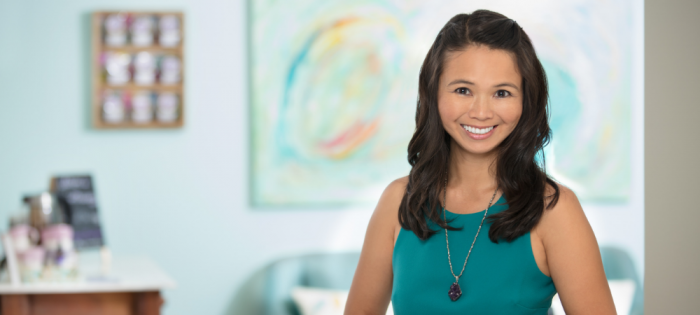

At one point in time, meditation was elusive to me. I had so many questions: “What do you do? What do you mean, you do nothing? What do I do with my thoughts? And how does this help me?” My mind raced pretty much non-stop, it did not know how to slow down.
I was in the middle of my pediatric residency at Albert Einstein, which is located in a tight-knit Italian neighborhood in the Bronx. My life then seemed chaotic and busy with long hours in the hospital and endless studies. I was totally sleep-deprived, thankful for whatever fast-food was available, and somewhat lost.
One day, walking down the street in my delirium, I looked up and saw a yoga sign. We rarely talked about yoga in medical school, but something called me to walk up the stairs to the studio. I needed a change and yoga fit the bill.
So it was in the Bronx I learned to meditate. I didn’t need a peaceful island oasis (although that couldn’t hurt), I just needed myself. And what did I do?
Well, it wasn’t so much about doing anything. It was about listening, and giving my mind a job — to pay attention to my breathing —at the same time to keep it happy. Minds are like that, you know, the mind can have a tendency to always have something to do, to think. My mind had been trained to solve multivariable calculus problems, but just focusing on breathing was like shifting gears completely.
Sometimes, we think we have to work hard to get results. In this case, it was actually the opposite — it was about taking a step back and letting the breath be in the forefront instead of the mind. All I had to do was watch my own breath with no agenda. If my breath had any nervous tension, it was OK. If it was deep and relaxed, it was OK. No judgment whatsoever. No trying to fix it or solve it. Just paying attention to my breath and letting it be, with loving patience, allowing it to remain the same or shift when it was ready.
I started doing this frequently and I found that I had more clarity, as if focusing on my breath gave me permission to clear my mind. My thoughts were no longer jumbled altogether but had room for creativity. I could make decisions more easily and problem-solve more efficiently. It helped me find calm in emergencies, to listen to others with presence, and to hear my own voice, as well.
Years later, this is still one of my go-to meditations. It’s such an empowering tool and requires no medication. Because of its many benefits, I now recommend simple meditation and mindful exercises to my patients and anyone experiencing stress and anxiety.
Watching the breath is simply elegant. I find it best to do with soft focus, rather than a hard stare. Most people feel more comfortable when given a welcoming acceptance than a judgmental stare. It’s best to treat ourselves how we’d like to be treated from others. Just attending to the breath with our minds without any criticism with what the breath is doing.
You may find the breath start to shift with your attention. Whatever it does, the mind’s job during meditation is to just support it with the loving encouragement of presence.
By bringing attention to our breathing, we are telling our breath that it is a priority. We, of course, could not live without it. Therefore, it makes sense to tend to the breath sometimes and just give it some love.
Over the years, simply nurturing my breath with my mind has had its ripple effects with those around me. It helps me connect with the emotional aspects behind illness. In patients, I’ve seen that the breath often gets stuck in pain or discomfort and tending to it can allow both the physiology and symptoms to improve.
Personally, paying attention to my breath has deepened my relationships with loved ones. Because the greatest gift we can give ourselves and others is just being ourselves with no pretense — or, in other words, the gift of our presence.
Much love,
Arlene Dijamco, MD
Dr. Arlene Dijamco is an integrative physician, pediatrician, cranial osteopath, and founder of the All Worlds Health family, which includes her practice, online school of integrative health (www.allworldshealthacademy.com), and foundation. After studying at Harvard, Emory, and Albert Einstein, Dr. Dijamco’s therapeutic toolbox expanded exponentially after attending Dr. Andrew Weil’s two-year integrative medicine fellowship in Arizona. She is also a happy mom of four fun girls, an awesome wife, a sometimes musician, and a tai chi and yoga enthusiast. Her hope is to help people connect with the emotional aspects underlying health. To learn more about her, visit www.allworldshealth.com.
Browse Front PageShare Your IdeaComments
Read Elephant’s Best Articles of the Week here.
Readers voted with your hearts, comments, views, and shares:
Click here to see which Writers & Issues Won.



